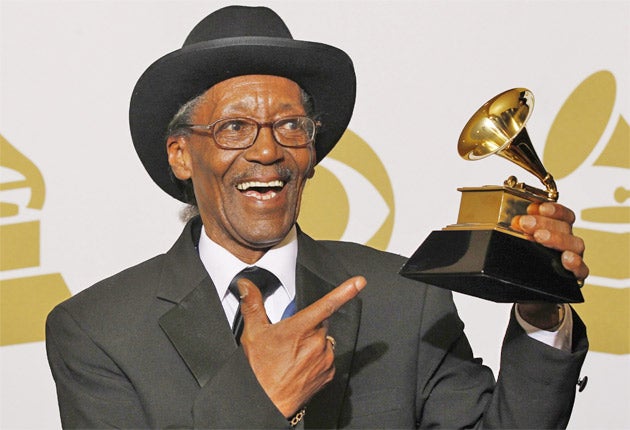Willie 'Big Eyes' Smith: Blues drummer and harmonica player renowned for his work with Muddy Waters

Your support helps us to tell the story
From reproductive rights to climate change to Big Tech, The Independent is on the ground when the story is developing. Whether it's investigating the financials of Elon Musk's pro-Trump PAC or producing our latest documentary, 'The A Word', which shines a light on the American women fighting for reproductive rights, we know how important it is to parse out the facts from the messaging.
At such a critical moment in US history, we need reporters on the ground. Your donation allows us to keep sending journalists to speak to both sides of the story.
The Independent is trusted by Americans across the entire political spectrum. And unlike many other quality news outlets, we choose not to lock Americans out of our reporting and analysis with paywalls. We believe quality journalism should be available to everyone, paid for by those who can afford it.
Your support makes all the difference.Willie "Big Eyes" Smith was a stalwart of the Chicago blues scene. A multi-award winning drummer, best known for his long tenure in Muddy Waters' band, he had more recently emerged as a bandleader in his own right and, earlier this year, won a Grammy for his collaboration with the veteran pianist, Pinetop Perkins, Joined at the Hip.
He was born in Helena, Arkansas, home to the world's longest-running daily radio show, King Biscuit Time on KFFA. Hosted by "Sunshine" Sonny Payne, it gave prime exposure to a number of important blues musicians, including Robert Nighthawk and Sonny Boy Williamson II. Listening to the show nurtured Smith's interest in music, as did a visit to Chicago, where he saw Muddy Waters play at the Club Zanzibar and was drawn to the work of the band's harmonica-player, Henry "Pot" Strong, a promising talent who was murdered by a jealous girlfriend shortly afterwards.
Smith took up the "harp" while in his late teens and relocated to Chicago where, in 1954, he formed a trio with guitarist Bobby Lee Burns and drummer Clifton James. As Little Willie Smith he backed Bo Diddley on a number of the latter's seminal Checker recordings such as "Dancing Girl" (1955) and "Who Do You Love?" (1956), and worked, too, with Johnny Shines and Arthur "Big Boy" Spires". Having decided that his choice of instrument was limiting his opportunities for work, he joined Little Hudson's Red Devil Trio as a drummer; it would remain his primary instrument.
By 1959 he was working on an occasional basis with, arguably, the most important figure in the Chicago blues field, Muddy Waters, and by 1961 had replaced Francis Clay as the singer's full-time drummer. He continued, too, to undertake session work, supporting James Cotton, and in 1964 playing behind Big Walter Horton on his debut album The Soul of Blues Harmonica. That same year saw Smith leave Waters and, it appeared, a career as a professional musician. The Beatles had spearheaded a musical invasion of America that undermined several genres, the blues among them, and for four years Smith worked in restaurants and as a taxi-driver. In 1968, however, he chanced upon a Waters' gig and, after being asked to sit in, returned to the fold, where he remained until 1980.
He can be heard on many of the sides Water recorded during the 1970s, including the Grammy-winning albums, They Call Me Muddy Waters (1970), Hard Again (1977), I'm Ready (1978) and Muddy "Mississippi" Waters – Live (1979). He developed a firm friendship with Pinetop Perkins, later recalling that he had first encountered the pianist as a six year-old back in Helena. He drummed on Perkins' Boogie Woogie King project in 1976, and played alongside a number of local acts, including Homesick James and Carey Bell.
In 1980, he, Perkins, bassist Calvin Jones and the white harmonica-player Jerry Portnoy left Waters following a dispute with his management and formed the Legendary Blues Band. Initially augmented by guitarist Louis Myers of the Aces, they appeared behind John Lee Hooker, as group of street musicians, in the movie The Blues Brothers (1980) and became a major attraction in their own right, touring with Bob Dylan, Eric Clapton and the Rolling Stones. The various permutations of the band recorded a series of albums for Rounder, Wild Dog Blues and the hip-hop label Ichiban, including Life of Ease (1981), Red Hot 'n' Blue (1983), the WC Handy Awards-nominated Woke Up With The Blues (1989) and Money Talks (1993). In 1999 Smith joined Muddy Waters' son, Big Bill Morganfield on the album Rising Son.
Having been named Drummer of the Year on a dozen occasions by the Blues Foundation, Smith increasingly reverted to the harmonica and proved himself a capable vocalist and songwriter. He recorded albums for Electro-Fi (Bluesin' It, 2004), Hightone (Way Back, 2006) and his own Big Eyes Records (Born in Arkansas, 2008), and in 2010 released a final project, Joined at the Hip, with Perkins, a disc that fittingly features his son Kenny "Beedy Eyes" Smith on drums.
Paul Wadey
Willie Smith, drummer, harmonica-player and singer: born Helena, Arkansas 19 January 1936 (married, one son); died Chicago 16 September 2011.
Join our commenting forum
Join thought-provoking conversations, follow other Independent readers and see their replies
Comments